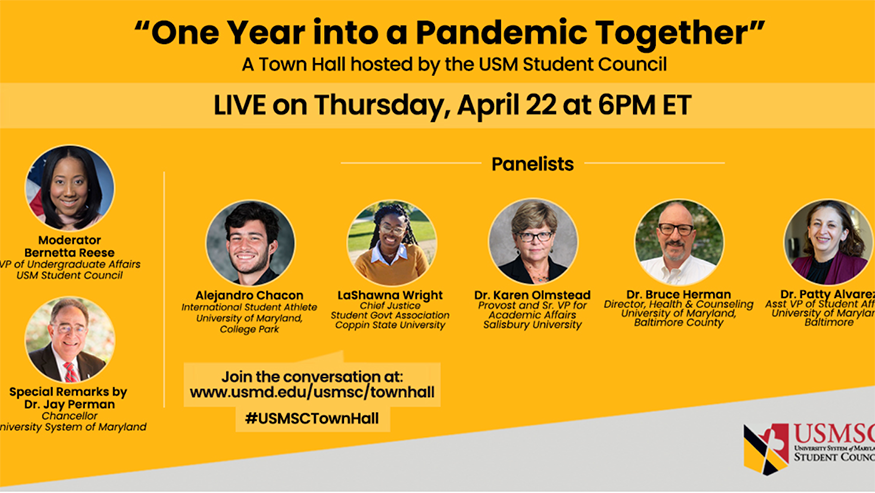The University System of Maryland Student Council reflected on challenges brought on by the COVID-19 pandemic and looked to the future during a town hall Thursday night.
The past year has brought on a plethora of momentous, stressful events: a global pandemic, racial injustices and a fraught presidential election.
System Chancellor Jay Perman opened the forum by sharing his relief on Derek Chauvin’s conviction earlier this week. Due to events in the past year, he said the system is examining its own complacency in regards to racial injustices in the past.
Perman applauded how students managed to support one another through the pandemic and help their peers, despite facing challenges like virtual learning and mental health struggles.
“What finishes my day the right way is watching how students make a difference. And I see it over and over, even in a pandemic,” Perman said.
Panelists speaking at the town hall all looked back at what the last year has been like for them. Alejandro Chacon, a University of Maryland men’s soccer player, described it as a challenging experience, but one he learned from.
[USM Board of Regents gives chancellor authority to determine mandatory vaccine policy]
For Dr. Bruce Herman, director of health and counseling at the University of Maryland, Baltimore County, COVID-19 was synonymous with the words “flux” and change. Those terms that also applied to other events in the past year, like social justice and shift in political climate. And yet, he said he has never felt so connected to colleagues and students.
“It’s been traumatic at so many levels, at different levels for different people and there is this sense of teamwork, a sense of that we’re working on this together,” Herman said.
LaShawna Wright is the chief justice of the Student Government Association at Coppin State University. She said that one of the biggest challenges in the past year for the historically Black university was the entry of their new president, Dr. Anthony Jenkins. But Jenkins proved to be a resource for the students, providing a weekly newsletter that kept students updated in the happenings of the world around them, particularly with racial tension and political climate.
“I think that definitely helped us as Black students to know that we have someone to go back to and have those difficult conversations with when trying to digest our emotions of what’s going on,” Wright said.
Panelists agreed that, despite universities’ attempts to provide students with resources, there is a level of exhaustion settling into the student body. It takes a level of discipline, Wright said, to maintain motivation during online classes.
[Maryland college students are helping out at mass vaccination sites across the state]
As an information science student, Chacon believes much of the technology professors have used during remote learning will be permanent assets to education — and other panelists agreed.
“Seeing all these resources take more steps towards the technology world, and give us more options, was definitely something that I appreciated and I think it’s going to continue in the future,” Chacon said.
The conversation soon turned to the future, including whether vaccines would be mandated at University System of Maryland institutions in the fall.
Some panelists, like Wright and Bernetta Reese, vice president of student affairs for the Student Council, haven’t made a decision on whether or not to get vaccinated.
Despite differences in vaccination status, most panelists agreed that vaccines were the solution to returning to normalcy. But there’s still a lot to discuss on whether or not the shots should be mandated, Herman said.
Still, Herman stressed the importance of vaccines.
“I think it’s really incumbent on universities to figure out how to make sure that we get our population vaccinated, so that we can help protect our loved ones, protect our campus and protect the rest of the vulnerable community,” Herman said.



